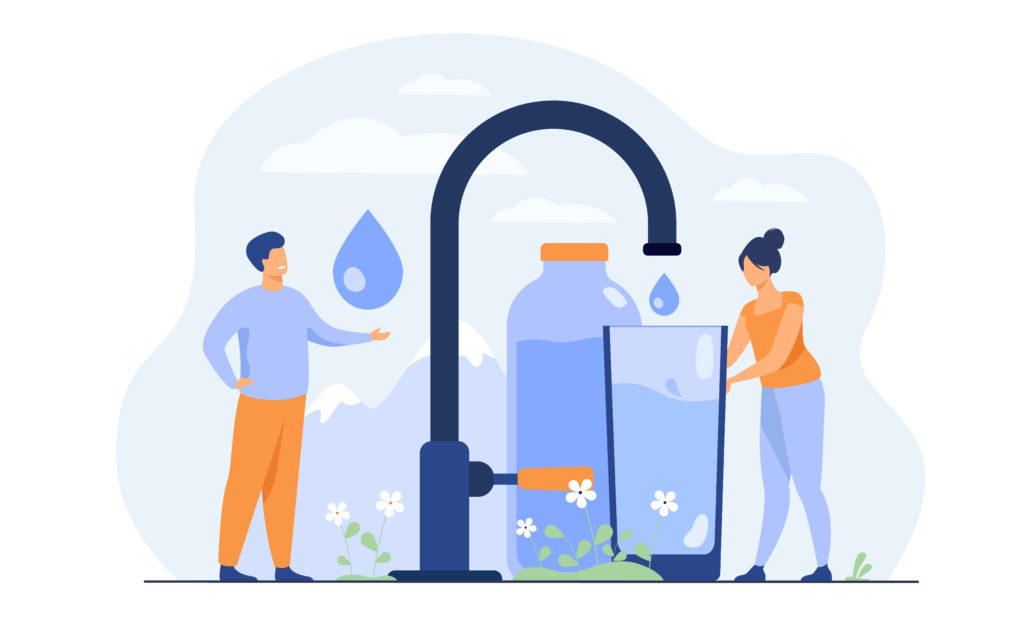
THE BOTTOM LINE:
Staying hydrated helps you sleep better
Finding a healthy water balance is important
Use strategies that ensure hydration benefits without it negatively impacting your sleep
Water is extremely important for your overall health. You would literally die without water.
*cue ominous music*
Sleep dehydrates you. Adequate hydration is necessary to keep all your bodily functions working at top-notch and is known for improving sleep. We say “adequate” because there is such a thing as too much water. Dehydration doesn’t just impair your function during the day, it can be disruptive to sleep. Finding a good water balance is the best way to ensure you maintain good health and quality sleep.
What does dehydration look like?
Before you can determine whether you are getting enough water, it’s important to evaluate what dehydration feels like. Water intake varies by day and engaging in certain activities can make you more likely to feel dehydrated. Chronic dehydration has various negative impacts on your health, including disrupted sleep.
Symptoms of dehydration:
Increased thirst and a dry mouth
Fatigue
Headaches and dizziness
Dry cool skin
Dark yellow pee
A rapid heart rate
Fever
Cramping
Do I drink too much water before bed, or not enough?
“Make sure you drink enough water but make sure you don’t drink too much!” Sure this sounds counterproductive, so, let us dive into how “too much water” or “not enough” water can negatively impact your sleep and what you can do to prevent it from happening.
Too much water on sleep
Drinking too much water before bed can lead to more bathroom trips throughout your night. Frequent wake-up calls to urinate (a condition called nocturia) leads to a disrupted sleep cycle and lost sleep. As a result, frequent urination during the night can cause health problems such as fatigue, depressed mood, irritability, and difficulty focusing.
Not enough water on sleep
If you do not drink enough water, you will become dehydrated and this can cause a number of different disturbances to your otherwise peaceful slumber:
- Snoring: Your nasal passages may become dry due to dehydration, which increases your risk of snoring and can worsen sleep apnea.
- High blood pressure: Dehydration can lead to high blood pressure, which has been found to cause trouble falling asleep.
- Dry mouth: If you aren’t drinking enough water during the day, this could cause you to wake up thirsty in the middle of the night.
- Reduced melatonin: Dehydration impairs many biological processes in your body and can reduce your levels of essential amino acids needed to produce melatonin. As a result, not getting enough water can disrupt your circadian rhythm, making it difficult for you to stay asleep.
- Less restoration: Your body performs important maintenance on every cell while you sleep. Every single action requires water. Therefore, sleeping dehydrated keeps your body from performing its activities optimally which can impair these very important processes such as forming memories, processing emotions, and clearing away waste.
- Charley horse: Dehydration increases the risk of painful involuntary leg cramps, which you’re probably thinking sounds like the worst alarm clock imaginable. If you have never woken up in a panic, struggling to get yourself up out of bed to work out that painful charley horse, count yourself lucky.
Why do I always wake up feeling parched
If you wake up with a dry mouth, you are not alone. Sleep dehydrates you, especially if you, like many people, breathe through your mouth while you sleep. Try starting your day off with a glass of water as soon as you wake up (even before you brush your teeth). You may also want to look into a humidifier – humidifiers have been found to improve your sleep by reducing dryness in your sleep environment.
If you still regularly wake up with a very raw or sore throat after adjusting for humidity, you may want to use an app like SnoreLab to assess whether snoring is an issue for you.
HYDRATE YOUR WAY TO BETTER SLEEP
Water is essential and it’s needed for absolutely every biological process in your body. Here are a few tips to maintain good hydration without interrupting your sleep:
1. AVOID DEHYDRATION
Research has found that people who sleep six hours or less a night are more likely to be dehydrated than people who sleep longer. That means– Dehydration can lead to sleep disturbances and sleep disturbances can lead to dehydration. As a result, this can leave you stuck in an endless loop that feels like it will never end. (be right back, grabbing a glass of water).
These suggestions can help you make sure you stay hydrated throughout the day:
Choose water
Avoid drinking too much caffeine, alcohol, or sugary beverages as they are known to cause sleep disturbances. Choose clean tap water, filtered water, or one of many delicious sparkling waters on the market.
Re-hydrate
Drink more water when you are active or overheated. Make sure to drink at least 20 ounces of water for every 30 minutes of exercise.
Keep water handy
Having a reusable water bottle can help you keep track of your water intake and remind you to keep sipping all day long.
Balance your diet
Fruits and vegetables have a high moisture content which can increase your water intake. Watermelon, for example, is 92% water. So, eat your fruits and veggies!
2. AVOID BATHROOM BREAKS
Waking up to pee is sad. While keeping hydrated throughout the entire day and evening is important, these suggestions can help you avoid those unwanted bathroom breaks:
Sips only before bed
Avoid drinking large quantities up to an hour before you want to be sleeping as this is generally the amount of time it takes for your body to process water. If you are thirsty try taking small sips of water instead of an entire glass.
Elevate your legs
When you lie down to sleep, your body reabsorbs water from your legs which can cause the need to urinate through the night. Try elevating your legs for 2 hours before bed to ensure this process takes place before you are asleep.
Pee before bed
Emptying your bladder before you go to sleep will reduce the chances of needing to urinate through the night. Try incorporating this into your bedtime routine.






